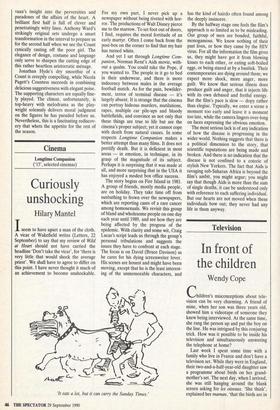Theatre
Private Lives (Aldwych) The Rehearsal (Almeida)
Static glamour
Christopher Edwards
You could say that Noel Coward's Private Lives offers us the odi et amo of light comedy. Nothing in the text justifies such an elevated interpretation, however. Indeed, the text is so slight, effervescent and so free of plot that it hardly exists (as the literary critic of the Times Literary Supplement so penetratingly observed in 1930). That is precisely its charm. It was written as an opportunity for Coward and Gertie Lawrence to demonstrate how style can triumph over content.
Its appeal lies solely in performance. Or rather, in the performers. This is not to underestimate its demands. To make Pri- vate Lives work the actors playing Elyot and Amanda have to embody all the virtues of what you might call the silk dressing-gown school of acting (prop. Noel Coward): poise, timing, elegance, in-
souciance etc. etc.
Joan Collins has her own trademark of chic. She is good at lying on sofas wiggling her toes and being catty. But her glamour is essentially static. Her voice lacks ex- pression and in the second act quarrel she fails to find anything of the tigress spirit that Amanda needs to make it come off. Worse still is her partner Keith Baxter. A fine actor in his own right, he is not made to play light comedy. He is too rugged, too sincere and has to try too hard to find all that sophisticated charm. What we get is posture instead of poise.
As a result, the production leans side- ways towards the two minor characters, Victor and Sybil. These figures were written in to act as ninepins for Coward and Lawrence to knock over. At the Aldwych, however, the unglamorous worms turn and Edward Duke and Sara Crowe steal the show by getting most of the laughs.
There is a rather more successful display of poise and artifice at the Almeida, whose autumn season gets off to a very promising start with a revival of Jean Anouilh's play The Rehearsal. A hedonistic Count and his circle of friends are rehearsing a play by that subtle anatomist of the heart Mari- vaux. Most of the `actors' in the Count's troupe adhere to the amorous rules and keep their dalliances within their own class. But the Count threatens to step outside the boundaries by falling for a young governess.
Anouilh's piece was written in 1950, although time and place seem to count for little. Indeed the informing spirit is more 18th- than 20th-century, as befits Mafi- 'I won't mince words, Mrs Horton, concerning your husband, we've had a negative patient- care outcome.' vaux's insight into the perversities and paradoxes of the affairs of the heart. A brilliant first half is full of clever and penetratingly witty lines. Anthony Ward's strikingly original sets undergo a smart transformation in the interval to prepare us for the second half when we see the Count cynically casting off the poor girl. The elegance of design, costume and language only serve to sharpen the cutting edge of this rather heartless aristocratic ménage.
Jonathan Hyde's dry smoothie of a Count is creepily compelling, while Nicola Pagett's Countess succeeds in combining delicious suggestiveness with elegant poise. The supporting characters are equally fine- ly played. The climax, unfortunately, is top-heavy with melodrama as the play- wright solemnly delivers moral judgment on the figures he has paraded before us. Nevertheless, this is a fascinating rediscov- ery that whets the appetite for the rest of the season.



























































 Previous page
Previous page